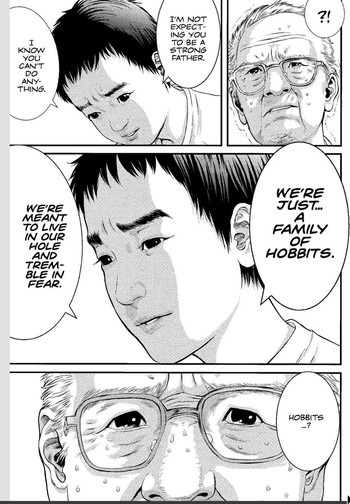House of 1000 Manga
Inuyashiki
by Jason Thompson,

Inuyashiki
“When I see old men eating beef bowls alone, late at night…lonely old salarymen…I wonder what their joy in life is. Why are they eating alone? Don’t they have families to be with?”
I almost read a YA shojo manga for this week, but instead, somehow, I'm reading a manga about a 58-year-old man. It's not the first oyaji manga and it won't be the last; in the 1990s Shogakukan briefly experimented with a manga magazine specifically aimed at the elderly, named Big Gold, but the truth is that many seinen and josei print magazines are aimed at an aging readership, drawn by aging authors, so why shouldn't there be elderly protagonists too? (And then there's Monthly Comic Ryu which boasted on the front cover “Recommended for ages 30 and up.”) But it's one thing reading a story about some attractive older person who looks great for their age (like all those hot middle-aged guys in Fumi Yoshinaga manga) and it's another thing to read about this guy: a wrinkly, white-haired, balding protagonist; a downtrodden old salaryman whose body is full of aches and pains. Ichiro Inuyasahiki (no relation to Inuyasha) is so old-looking, people see him next to his kids and think he's their grandfather, not their dad. He's the equivalent of one of those dorky shonen manga protagonists who's so pathetic that any reader can think “At least I'm not that guy,” only he's 40 years older.
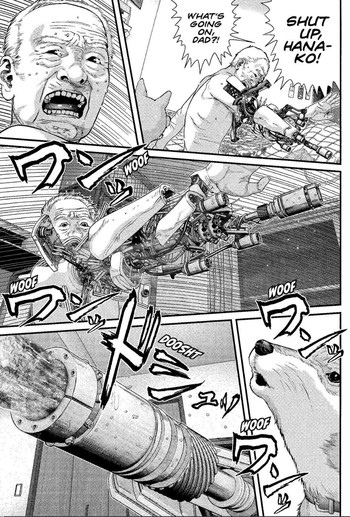
Inuyashiki is the kind of guy who'd be a background character in another manga. He's out of shape, timid and short. He worked his whole life to buy a mediocre house in the shade of a larger building. His family doesn't care about him, except for his one friend, his dog Hanako. On the subway he sees muggers harassing other middle-aged men, but he's too timid to intervene; his equally wimpy son sees this and hates both of them for it. (“We're just a family of hobbits. We're meant to live in our hole and tremble in fear!”) As if he dreary life weren't bad enough, one day his doctor gives him bad news: he has stomach cancer and only has a few months to live. His first instinct is to tell his family, but none of them will pick up his phone call, so he goes out to the park at night with his dog and cries and cries.
That's when the alien spaceship hits him and blasts him to pieces. The unseen aliens make a hasty decision to cover up their interference in Earth by…giving him a brand-new robot body, of course! Inuyashiki wakes up the next morning in the park, not sure what happened. At first he thinks the weird changes in his body are due to the cancer: his back pain is gone and he doesn't need glasses anymore. Then his arm starts steaming and unfolds into a metal cybergun which shoots out…the undigested meal he ate the day before. Also, pushing a button in his chin makes his head open up, revealing a bunch of metal nodules where he used to have a brain. And that's when he REALLY freaks out: is he human anymore? Is he even himself any more?
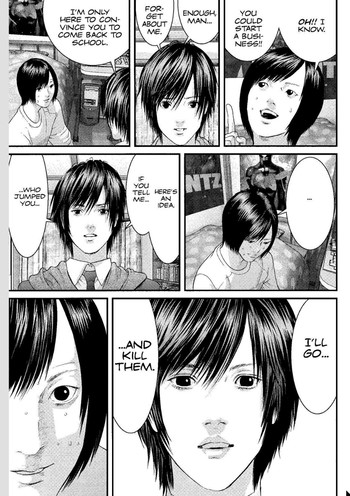
Yes, Inuyashiki is the story of an old man who turns into a military-grade super-robot (you need some flesh to be a cyborg, right?) and the violent adventures that ensue. If you have any doubt that it's violent, know that it's by Hiroya Oku, whose famous science fiction manga Gantz (the possible subject of a future House of 1000 Manga) was known for its graphically detailed gore. The same photo-vivid art and body horror is back in Inuyashiki, in which wrinkly flesh splits open to reveal arrays of metal parts, as if the manga isn't sure whether alien cybernetics is a blessing that brings new life to the elderly (like the ‘80s movie Cocoon but without the sex) or just another indignity of old age. It'd be easy to imagine this done as a comedy—like Takeshi Obata's Cyborg Jii-san G—but Inuyashiki plays it completely straight-faced, even when cyborgs are producing USB ports from their fingernails (they aren't 100% wireless?).
Reading this manga on Crunchyroll (where it's currently running, simultaneous with its Japanese release in Evening magazine; the print edition comes out from Kodansha Comics in August) I spent the first few chapters wondering, where is this going? Is it a satire, about the absurdity of a senile old man with robot powers, like Roujin Z? Or will it be a bitter-old-man story where Inuyashiki turns on everyone, leaving a trail of bloodshed, like Frank Miller's Hard Boiled? But in fact, Inuyashiki is something even more familiar to Western readers: a superhero story. There's no capes or costumes, just a shirtless old man running and flying around (he has to take his shirt off or it burns up when he activates his rockets), but as our hero discovers the ever-widening scope of his powers, he uses them to save people and fight injustice. Like Superman, he hears people's cries for help with his super-hearing, and he can't ignore them. He saves a homeless man from being killed by vicious kids, subduing them with tiny micro-missiles and then shaming them on social media with video evidence of their crimes (!!). He uses his super-strength to save a couple from vicious yakuza. Helping others gives Inuyashiki his new reason for existence. (“I am a human being…I have a heart!”) Such is his hand-wavey nigh-omnipotence, he even learns that he has the power to heal, curing cancer with his electromagnetic touch! Toshi Nakamura of Kotaku compared Inuyashiki to Breaking Bad, another series about an old guy who gets cancer and has a change of lifestyle, but instead of using his powers for evil, Inuyashiki goes full-on good. (Though there's an element of bitter-old-manness in the clichéd manga way young people are portrayed as vicious thugs and muggers.)
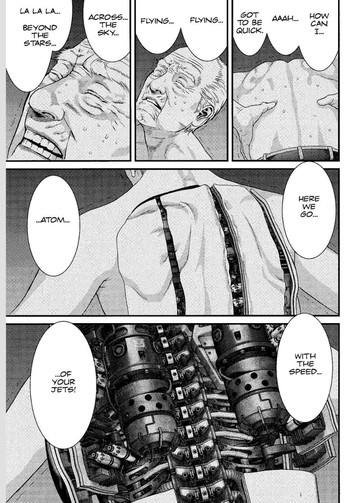
But every superhero needs a villain to fight, and like Gantz, Inuyashiki also contains horrifying evil. Turns out that another person was also killed and reconstituted by the aliens: Hiro Shishigami, a friendly, handsome teenager, the kind of nice guy who goes to his childhood friend's house to convince him to go back to school after bullies scare him away. Hiro cares about his friends; however, he doesn't care about anyone else, and he uses his newfound robot powers to kill people he thinks aren't worth living (“When you get down to it, no one really matters aside from family and friends. Who cares if other people live or die? In fact, it's usually way more shocking to me if someone dies in a manga or anime or something.”) Ando, his buddy, can't believe it when Hiro starts promising to kill the people who bullied him. It's one thing to talk about it…but to actually kill someone? As a bit of self-promotion, and doubtless as an F-you to people who thought Gantz was a bad moral influence, the harmess Ando turns out to be a fan of Gantz while Hiro, the amoral sociopath, prefers One Piece. (“You're one of those crazy Gantz cultists. You read that shitty manga full of murder and crap!” “It's not a shitty manga. Don't talk smack about Gantz.” “Everyone on the net says it's shitty!”) As criticism, this actually sorta makes sense: the typical shonen manga is all about the importance of family and friends, and people who talk about universal moral ideals are usually uptight hypocrites or megalomaniacal villains, like Light in Death Note. In contrast, here it's the idealistic Inuyashiki who is the hero, and the self-centered Hiro (even though his concept of ‘self’ includes his family and Ando) is a ruthless monster. When things get violent, Hiroya Oku slathers the pages in gore, but like in Gantz, it's never just about the gore: Ando's justifications and twisted morality are more chilling than the actual deaths, and the realistic (even bland) dialogue and everyday settings make the eventual violence that much more shocking.
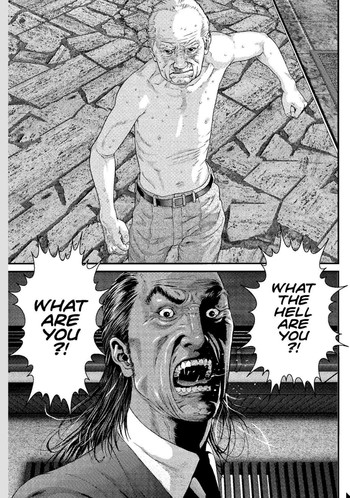
Readers of Gantz are generally divided between those who think it's a cool, dark, gory science fiction series, and those who think it's an amoral, nihilistic stain on humanity, and the same battle lines will be drawn between readers of Inuyashiki. Three volumes in (Oku has said the series will run for 10 volumes), this series has a brighter outlook than that one, with an idealistic hero facing few of the brutal “the end justifies the means” decisions the Gantz characters must constantly make. But there's still head-crushings and eye-gougings, some of them perpetrated by Inuyashiki himself, who doesn't kill but isn't above inflicting permanent injury. Perhaps you could say he has no choice, for there are evil, evil people out there, murderers and rapists (warning: both men and women get raped in Inuyashiki) who stoke the reader's, and the hero's, righteous rage. It's definitely catharsis to watch the horribly evil get splattered by a weak-looking little old man, but a pattern emerges of new innocent characters being introduced just so they can be abused by villains and give Inuyashiki an opportunity to avenge them, as if Oku had not only reinvented the supehero genre in some alien laboratory but speed-evolved it to the early 1990s and the refrigerator cliché. And will the new, super-oyaji Inuyashiki ever make his peace with his family, or will they remain two-dimensional ciphers who hardly show up after the first volume?
Oku's art is good, and Inuyashiki has good moments of cybernetic body horror and scary villainy. But it doesn't have the central what-is-going-on mystery of Gantz to keep your interest, and as an idealistic superhero series it could use more confirmation that the people are actually good and worth saving. That, and the dog. I want more scenes with the dog.
There's only FOUR DAYS left in my Kickstarter for Mangaka: The Fast & Furious Game of Drawing Comics!If you like manga or gaming, go support it now!
discuss this in the forum (20 posts) |
